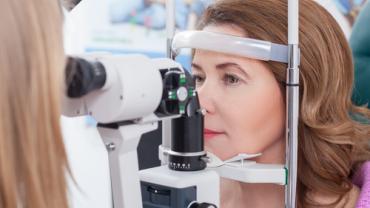
The old saying “the eyes are a window to the soul” might well be amended to say, “The eyes are a window to the brain.”
A paper published in the journal Alzheimer’s and Dementia adds more evidence to an established link between ophthalmic conditions and increased risk for Alzheimer’s disease. The paper, “Associations between recent and established ophthalmic conditions and risk of Alzheimer’s disease,” found that glaucoma, age-related macular degeneration, and diabetic retinopathy, but not cataracts, are associated with increased risk for Alzheimer’s. This suggests that ophthalmologists might be in a unique position to identify patients at risk earlier than other healthcare professionals.
Identification of an association between these ocular conditions and increased risk for Alzheimer’s disease (AD) reinforces what has long been known about AD: higher blood glucose—even within the “normal,” non-diabetic range—is also associated with increased AD risk. (It’s not for nothing that AD is now regularly referred to as “type 3 diabetes” or “brain insulin resistance.”) And while diabetic retinopathy implies right there in its name that chronically elevated blood glucose is the driving cause, hyperglycemia and/or hyperinsulinemia are also likely contributing factors to other conditions affecting the eyes.
This is true for glaucoma as well as the other condition identified in the paper as being associated with increased AD risk, age-related macular degeneration (AMD). A study of Korean adults showed that after adjusting for age, sex, smoking, obesity and hypertension, a significant association was found between diabetes and early AMD (odds ratio, 1.87; 95% confidence
interval, 1.07-3.28). It stands to reason that the same might be observed among non-diabetics—that is, people with blood sugar that’s slightly high, but still in the normal range, might be at increased risk for AMD.
The study at hand involved 3877 subjects in the Adult Changes in Thought database. They were 65 years of age or older and were free of AD at baseline. Over the five-year study, 792 of them received an Alzheimer’s diagnosis. Subjects with AMD, diabetic retinopathy, or glaucoma had a 40-50% greater risk for developing AD compared to similar individuals who did not have any of those ophthalmologic conditions.
Dr. Paul Crane, one of the study’s authors, said, “What we found was not subtle.”
Indeed. A 50% increase in risk for AD is no small number. Of course, there’s an association/causation issue here: no one is arguing that AMD, glaucoma, or diabetic retinopathy cause Alzheimer’s. But by identifying associations between eye health problems and risk for dementia, what this study does is implicate chronically elevated blood sugar as a contributing driver of dementia even more than it already was.
This study isn’t the first to bring attention to the link between retinal microvascular changes and increased risk for dementia. A systematic review found that retinal vascular damage was associated with poorer cognitive function, dementia, and brain imaging abnormalities. Associations were strongest when retinal vascular abnormalities were more severe, “supporting a role for vascular disease as the underlying pathophysiology of cognitive decline and brain changes.”
It’s not unusual for an ophthalmologist to be the first medical professional to recognize when a patient has T2 diabetes. Vascular changes to the retina might be present before an elevated fasting glucose or HbA1c would clue in a primary care physician during a routine checkup. And it may be that similar changes in eye health, including the development of AMD or glaucoma, could occur long before cognitive impairment becomes evident. Going by conventional care models, however, being that there is no known effective treatment for Alzheimer’s or mild cognitive impairment, early identification of those at risk serves little purpose, considering there’s “nothing they can do” about it. Fortunately, however, progressive and forward-thinking medical professionals are looking into ketogenic diets and other diet and lifestyle interventions to make a dent in this most dreaded disease.
By Amy Berger, MS, CNS